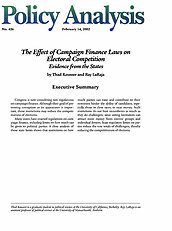Many states have enacted regulations on campaign finance, including limits on how much can be given to political parties. A close analysis of those state limits shows that restrictions on how much parties can raise and contribute to their nominees hinder the ability of candidates, especially those in close races, to raise money. Such restrictions do not hurt incumbents as much as they do challengers, since sitting lawmakers can attract more money from interest groups and individual donors. State regulatory limits on parties reduce the vote totals of challengers, thereby reducing the competitiveness of elections.
The Effect of Campaign Finance Laws on Electoral Competition: Evidence from the States
Congress is now considering new regulations on campaign finance. Although their goal of preventing corruption or its appearance is important, those restrictions may reduce the competitiveness of elections.
About the Authors
Thad Kousser is a graduate student in political science at the University of California, Berkeley. Ray LaRaja is an assistant professor of political science at the University of Massachusetts, Amherst.

This work is licensed under a Creative Commons Attribution-NonCommercial-ShareAlike 4.0 International License.
